Places the U.S. Government Warns Not to Travel Right Now
You may want to reconsider traveling to these countries right now.
Do Not Travel to These Countries

Getty Images
Crime, civil unrest and terrorism are common risk factors for countries that end up on the State Department's "Do Not Travel" advisory list.
In 2024, tourism across the globe is “well on track” to return to pre-pandemic levels, according to projections by UN Tourism.
Global conflicts and natural disasters , ranging from a series of coups across Africa to catastrophic earthquakes in the Middle East affected international travel patterns throughout 2023. Still, international tourist arrivals reached 87% of pre-pandemic levels in 2023, according to estimates by UN Tourism .
In January 2024 alone, about 4.6 million U.S. citizens left the country for international destinations, 17% higher than the same month in 2019, according to the International Trade Administration . But some destinations warrant more caution than others.
On Oct. 19, 2023, following the outbreak of war between Israel and Gaza and flaring tensions in the region, the U.S. State Department issued a worldwide caution advisory due to “increased tensions in various locations around the world, the potential for terrorist attacks, demonstrations or violent actions against U.S. citizens and interests.” Prior to this update, the most recent worldwide caution advisory was issued in 2022 after a U.S. strike killed Ayman al-Zawahiri, Osama bin Laden’s successor as leader of Al Qaeda, causing “a higher potential for anti-American violence.” The worldwide caution advisory remains in effect.
The U.S. State Department also issues individual travel advisory levels for more than 200 countries globally, continually updating them based on a variety of risk indicators such as health, terrorism and civil unrest. Travel advisory levels range from Level 1, which means exercise normal precautions, to Level 4, which means do not travel there.
About 10% of countries – 19 total – have a Level 4: “Do Not Travel” advisory as of Mar. 4. In Level 4 countries, the U.S. government may have “very limited ability” to step in should travelers’ safety or security be at risk, according to the State Department. Crime, civil unrest, kidnapping and terrorism are common risk factors associated with Level 4 countries.
So far in 2024, the State Department made changes to the existing Level 4 advisories for Myanmar, Iran and Gaza, and moved Niger and Lebanon off of the Level 4 list.
Places With a Level 4 Travel Advisory
These are the primary areas the U.S. government says not to travel to right now, in alphabetical order:
Jump to Place: Afghanistan Belarus Burkina Faso Central African Republic Myanmar (formerly Burma) Gaza Haiti Iran Iraq Libya Mali Mexico North Korea (Democratic People's Republic of Korea) Russia Somalia South Sudan Sudan Syria Ukraine Venezuela Yemen
Afghanistan: The Central Asian country is wrestling with “terrorism, risk of wrongful detention, kidnapping and crime,” according to the State Department. U.S. citizens are specifically at risk for wrongful detention and kidnapping. In 2022, the government reinstituted public floggings and executions, and women’s rights are disappearing under Taliban control. The U.S. Embassy in Kabul halted operations in August 2021. Since the Taliban took control , many forms of international aid have been halted . Meanwhile, in 2023, some of the year’s deadliest earthquakes killed more than 2,400 in Afghanistan while the country continues to face a years-long extreme drought.
Belarus: Belarus, which shares a western border with Russia and a southern border with Ukraine, has been flagged for “Belarusian authorities’ continued facilitation of Russia’s war against Ukraine, the buildup of Russian military forces in Belarus, the arbitrary enforcement of local laws, the potential of civil unrest, the risk of detention, and the Embassy’s limited ability to assist U.S. citizens residing in or traveling to Belarus.” The U.S. Embassy in Minsk halted operations in February 2022.
Burkina Faso: Terrorism, crime and kidnapping are plaguing this West African nation. Terrorist attacks may target hotels, restaurants and schools with little to no warning, and the East and Sahel regions of the country are under a state of emergency. In late November 2023, hundreds died in clashes between state security forces and rebels near the country’s border with Mali. In June, more than 2 million people in Burkina Faso were displaced due to “violence linked to al-Qaida and the Islamic State group.”
Central African Republic: While there have not been specific incidents of U.S. citizens targeted with violence or crime, violent crime and sudden closure of roads and borders is common. The advisory states that “Embassy Bangui’s limited capacity to provide support to U.S. citizens, crime, civil unrest, and kidnapping” is a factor in its assessment. Recent data from UNICEF suggests the country has the worst drinking water accessibility of all countries in 2022.
Myanmar (Formerly Burma): Armed conflict and civil unrest are the primary reasons to not travel to this Southeast Asian country, which experienced a military coup in early 2021. Limited health care resources, wrongful detentions and “areas with land mines and unexploded ordnance” are also listed as risk factors. After Ukraine and Israel, Myanmar had the highest conflict-related death toll in 2023.
Gaza : Hamas, a foreign terrorist organization as designated by the State Department, controls much of the Gaza Strip, which shares borders with both Israel and Egypt. On Oct. 7, 2023, Hamas fighters broke across the border into Israel, killing hundreds of civilians and soldiers in a brazen attack that stunned Israelis. On Oct. 10, Israel hit the Gaza Strip with “the fiercest air strikes in its 75-year conflict” according to Reuters . The conflict has since escalated into war between Israel and Hamas, with regular Israeli airstrikes leading to extensive civilian casualties in Gaza. As of mid-December, nearly 85% of Gaza’s population were displaced from their homes, according to UN estimates . The region continues to face shortages of food , water, electricity and medical supplies , with conditions deemed “far beyond a humanitarian crisis.” The State Department warns of terrorism and armed conflict within Gaza’s borders.
Haiti: In July 2023, the Department of State ordered all non-emergency U.S. government personnel and family members to leave the U.S. Embassy in Port-au-Prince in response to the increased risk of kidnapping and violent crime in the country , as well as armed conflict between gangs and police. The travel advisory states that cases of kidnapping “often involve ransom negotiations and U.S. citizen victims have been physically harmed during kidnappings.” The travel advisory also states that “U.S. citizens in Haiti should depart Haiti as soon as possible” given “the current security situation and infrastructure challenges.” A series of gang attacks in late September 2023 caused thousands to flee their homes, and many aid groups have been forced to cut or suspend operations amid escalating violence in recent months.
Iran: Terrorism, kidnapping and civil unrest are risk factors for all travelers to Iran, while U.S. citizens are specifically at risk for “arbitrary arrest.” U.S.-Iranian nationals such as students, journalists and business travelers have been arrested on charges of espionage and threatening national security. Executions in Iran rose sharply between 2021 and 2022, bringing the country’s total to nearly 580 people over the year, according to a report by Amnesty International released in May 2023.
Iraq: The State Department cites “terrorism, kidnapping, armed conflict [and] civil unrest” as cause for the country’s Level 4 distinction. Iraq’s northern borders, and its border with Syria, are especially dangerous. Since the escalation of conflict in neighboring Israel in October, there has been an increase in attacks against Iraqi military bases, which host U.S. troops and other international forces. In October 2023, non-emergency U.S. government personnel and eligible family members were ordered to leave the U.S. embassy in Baghdad.
Libya: Following the end of its dictatorship over a decade ago, Libya has been wrought with internal conflict between armed groups in the East and West. Armed conflict, civil unrest, crime, kidnapping and terrorism are all risk factors. U.S. citizens have been targets of kidnapping for ransom, with terrorists targeting hotels and airports frequented by Westerners. The U.S. Embassy in Tripoli halted operations in 2014. In mid-September 2023, floods, which some say were intensified by climate change , killed thousands in eastern Libya. Clashes between armed factions escalated across the country in the latter half of 2023, including in the capital city of Tripoli and in Benghazi.
Mali: After experiencing military coups in 2020 and 2021, crime, terrorism and kidnapping are all prevalent threats in this West African landlocked nation. In July 2022, non-emergency U.S. government employees and their families were ordered to leave the country due to higher risk of terrorist activity. A U.N. report in August 2023 said that military groups in the country, including both Mali security forces and possibly Russian Wagner mercenaries, were spreading terror through the use of violence against women and human rights abuses. Democratic elections were supposed to occur in February 2024, but Mali’s military junta postponed the plans indefinitely. In December, the U.N. officially ended a decade-long peacekeeping presence in the country, which had been among the agency’s deadliest missions, with hundreds of the mission personnel killed since 2013.
Mexico: Each state in Mexico is assessed separately for travel advisory levels. Six of the 32 states in Mexico are designated as Level 4: Colima, Guerrero, Michoacan, Sinaloa, Tamaulipas and Zacatecas. Crime and kidnapping are listed as the primary risk factors throughout the country. Nearly 112,000 people were missing across the country as of October, a number the U.N. has called “alarming.”
North Korea (Democratic People’s Republic of Korea): U.S. passports are not valid for travel “to, in, or through” this country, home to one of the world's longest-running dynastic dictatorships. The travel advisory states that the Level 4 distinction is due to “the continuing serious risk of arrest and long-term detention of U.S. nationals.” In July 2023, a U.S. soldier fled across the border into North Korea, where he is believed to be in North Korean custody, the first American detained in the North in nearly five years. He was returned to U.S. custody in September 2023.
Russia: The travel advisory for Russia cites its invasion of Ukraine , harassment of U.S. citizens by Russian government officials and arbitrary law enforcement as a few of the reasons for the Level 4 designation. Chechnya and Mount Elbrus are specifically listed as Level 4 regions. Terrorism, civil unrest, health, kidnapping and wrongful detention are all noted as risks.

Russia Invades Ukraine: A Timeline

Somalia: A severe drought resulting from five failed rainy seasons in a row killed 43,000 people in 2022, and caused a famine amid conflict with Islamist insurgents . Violent crime is common throughout Somalia , pirates frequent its coast off the Horn of Africa, and medical facilities, where they exist, have limited capacity. Crime, terrorism, civil unrest, health and kidnapping are all risk factors. In January 2024, some passengers aboard a U.N.-contracted helicopter were taken hostage by al-Shabaab militants after the vehicle crashed in central Somalia.
South Sudan: Crime, kidnapping and armed conflict are the primary risk factors for South Sudan, which separated from Sudan in 2011, making it the world’s newest country . Weapons are readily available, and travelers have been victims of sexual assault and armed robbery.
Sudan: The U.S. evacuated its embassy in Khartoum in April 2023, and the country closed its airspace due to the ongoing conflict in the country, only permitting humanitarian aid and evacuation efforts. Fighting has escalated in the region between two warring generals seeking to gain control after a military coup in 2021 ousted the country’s prime minister. Civil unrest is the primary risk factor for Africa’s third largest country by area. Crime, terrorism, kidnapping and armed conflict are also noted. The International Criminal Court began investigating alleged war crimes and violence against African ethnic groups in the country in 2023. Millions have fled their homes due to conflict, and the U.N. has said its efforts to provide aid have been hindered by a lack of support, safety and resources. As recently as December 2023, the United Nations warned of catastrophic famine , with millions of children at-risk for malnutrition .
Syria: The advisory states that “No part of Syria is safe from violence,” with terrorism, civil unrest, kidnapping, armed conflict and risk of unjust detention all potential risk factors. U.S. citizens are often a target for kidnappings and detention. The U.S. Embassy in Damascus halted operations in 2012. Fighting in neighboring Israel has escalated since October, and the conflict has spilled over into Syria, where the U.S. has carried out air strikes following drone and rocket attacks against American troops in Syria and Iraq, triggered by the Israel-Hamas war.
Ukraine: Russian setbacks in their invasion of Ukraine buoyed hopes in Ukraine in 2023. However, Ukraine is a Level 4 country due to Russia’s invasion, with crime and civil unrest also noted as risk factors. The country’s forces shot down two Russian fighter jets on Christmas Eve 2023, in a move Ukrainian President Volodymyr Zelenskyy said “sets the right mood for the entire year ahead.”
Venezuela: Human rights abuses and lack of health care plague this South American nation, which has been in a political crisis since 2014. In 2019, diplomatic personnel were withdrawn from the U.S. Embassy in Caracas. Threats in the country include crime, civil unrest, kidnapping, wrongful detention and poor health infrastructure.
Yemen: Six of the nine risk factors defined by the State Department – terrorism, civil unrest, health risks, kidnapping, armed conflict and landmines – are all present in Yemen. Despite private companies offering tourist visits to the Yemeni island of Socotra, the U.S. government argues those arranging such visits “are putting tourists in danger.” Civil war and cholera are also both present throughout the country. The U.S. Embassy in Sanaa halted operations in 2015. The country has experienced a relative lull in the civil war fighting, but as peace negotiations have gotten traction, flare ups in the fighting have jeopardized progress. Most recently, the U.S. and U.K. have carried out a series of airstrikes in the country, targeting Iran-backed Houthi sites.
Other Countries to Watch
Since Jan. 1, the State Department has updated travel advisories for 17 different countries as well as for the West Bank and Gaza, adding information about specific regions or risk factors, or simply renewing an existing advisory. Travel advisory levels can change based on several factors in a nation, such as increased civil unrest, policies that affect human rights or higher risks of unlawful detention.
The State Department has given about 25 countries an assessment of Level 3, meaning it recommends people “reconsider travel” to those destinations.
On Oct. 14, one week after the deadly Hamas attack on Israel, Israel and the West Bank were both moved from Level 2 to Level 3, while Gaza remains at Level 4. The region’s travel advisory was updated in November to reflect travel restrictions for certain government employees who have not already left the area, and it was updated again on Jan. 3.
Following the outbreak of the Israel-Hamas war in early October, the U.S. State Department raised Lebanon ’s travel advisory level from a Level 3 to a Level 4 level due to “the unpredictable security situation related to rocket, missile, and artillery exchanges” between Israel and Hezbollah or other militant groups. In December, the U.S. Embassy in Beirut returned to normal staffing and presence, and on Jan. 29, the country was moved back to Level 3. Crime, terrorism, armed conflict, civil unrest, kidnapping and unexploded landmines are listed as the country’s primary risk factors. However, the country’s borders with Syria and with Israel, as well as refugee settlements within Lebanon, are specifically noted as Level 4 regions.
China became a Level 3 country in late 2020, with an update in December 2022 citing “the surge in COVID-19 cases, arbitrary enforcement of local laws, and COVID-19-related restrictions” as the reason for the advisory. In June 2023, the Hong Kong Special Administrative Region (SAR) was moved from the Level 3 to the Level 2 list, but travelers are still advised to be cautious in the area due to “arbitrary enforcement of local laws.” Meanwhile, Macau remains at Level 3.
Following an attempted coup in August 2023, Niger was elevated to Level 4 in August and the Department of State ordered all non-emergency U.S. government personnel and family members to leave the U.S. Embassy in Niamey. In early January 2024, the overall risk level for the country was lowered back to Level 3. Despite the new classification, the State Department still asks non-emergency government personnel and eligible family members to depart the country.
In mid-December 2023 there was an explosion at Guinea’s main fuel depot which has since affected access to health care and basic goods and services. The country was subsequently designated a Level 3 nation after having previously been Level 2. Concerns about civil unrest, health, crime and fuel shortages impacting local infrastructure were listed as the primary risk factors contributing to the change.
Several Level 3 countries are among the worst countries for human trafficking, as designated by the State Department’s annual Trafficking in Persons Report . Level 3 countries on this list include Papua New Guinea, Guinea Bissau, China and Chad. There are also nine Level 4 countries designated as among the worst for human trafficking: Afghanistan, Belarus, Iran, Myanmar, North Korea, Russia, Syria, South Sudan and Venezuela.
Over 70 countries are currently at Level 2, meaning the State Department recommends travelers “exercise increased caution” when traveling to those destinations.
Botswana became the newest Level 2 country on Feb. 26 after having previously been Level 1, with crime noted as the primary risk factor.
France, which saw nationwide protests throughout 2023, has civil unrest and terrorism noted as risk factors for its Level 2 status, and Sweden’s Level 2 status is associated with risks of terrorism.
The Level 2 travel advisory for the Bahamas was updated in January to reflect water safety concerns. The advisory warns that “activities involving commercial recreational watercraft, including water tours, are not consistently regulated” and notes that government personnel are “not permitted to use independently operated jet-ski rentals on New Providence and Paradise Islands.” It also warns visitors to be mindful of sharks, weather and water conditions. The advisory also says that crime is a primary risk factor with gang-on-gang violence contributing to high homicide rates in some areas. Visitors are asked to “be vigilant” and to not physically resist robbery attempts.
Bangladesh 's Level 2 travel advisory was updated in October 2023 to add a note about the country’s general election , which took place Jan. 7, 2024. The advisory states “demonstrations intended to be peaceful can turn confrontational and escalate into violence.” The U.S. has since claimed the country’s election was not free nor fair.
In November 2023, several Level 2 travel advisories were updated with new cautionary information. The advisory for Ghana was updated to reflect threats against LGBTQI+ travelers specifically, noting “anti-LGBTQI+ rhetoric and violence have increased in recent years.” Meanwhile, the advisory for South Africa was updated in February to note that routes recommended by GPS may be unsafe with higher risk for crime.
Turkmenistan was moved off of the Level 2 list to become the newest addition to the Level 1 list on Jan. 22, meaning normal precautions are recommended but there are no risk factors causing travelers to practice increased caution.
The State Department asks travelers to pay attention to travel advisory levels and alerts , review country information pages for their destinations and read related country security reports before going abroad.
Join the Conversation
Tags: Russia , Ukraine , Travel , Coronavirus , Travel Tips , Israel , Gaza , violence , Civil War , crime , kidnapping
Recent Articles
Best countries.

Education News

Best Countries Rankings
- # 1 Switzerland
- # 5 Australia
- # 5 United States
Health News Bulletin
Stay informed on the latest news on health and COVID-19 from the editors at U.S. News & World Report.
Sign in to manage your newsletters »
Sign up to receive the latest updates from U.S News & World Report and our trusted partners and sponsors. By clicking submit, you are agreeing to our Terms and Conditions & Privacy Policy .
You May Also Like
Switzerland is world's best country.
Julia Haines Sept. 6, 2023

Photos: Best Countries Around the World
Sept. 6, 2023

The 25 Best Countries in the World
Elliott Davis Jr. Sept. 6, 2023

Exclusive-China Harbors Ship Tied to North Korea-Russia Arms Transfers, Satellite Images Show
Reuters April 25, 2024

Russian Programmers Play 'Cat and Mouse' Game to Outsmart Censors


- Arts, History & Culture
- Attractions & Family Fun
- Texas Beaches
- Food & Drink
- Music & Film
- Outdoor Adventure
- Texas Road Trips
- The Western Experience
- Texas Cities
- Big Bend Country
- Hill Country
- Panhandle Plains
- Piney Woods
- Prairies & Lakes
- South Texas Plains
- Texas Travel Guide
- Hotels, Resorts and B&Bs
- Campgrounds
- Guest Ranches
- The Great Texas Eclipse
- Where to Stay in the Prairies & Lakes
- Getting Outdoors in the Prairies & Lakes
- Online Travel Guide
Check out your destination cities, hotels, restaurants and desired attractions prior to departure. Links to the tourism websites of Texas cities can be found below:
- Recommended
- No available filters
We use cookies to improve your experience and to analyze the use of our website. By continuing to use our site, you agree to our Privacy Policy .
- Travel & Meeting Pros
- Accessibility
- Privacy Policy & Terms Of Use

All Material © 2024 Office of the Governor, Economic Development and Tourism. All Rights Reserved. Reproduction in whole or in part is prohibited without the written permission of the publisher. Office of the Governor, Economic Development & Tourism 1100 San Jacinto, Austin, Texas 78701, (512) 463-2000
Skip to main content

Texas Travel Advisory
- Esta Página en Español

STATE OF TEXAS — Exercise increased caution in Texas due to risk of civil and constitutional rights violations
The American Civil Liberties Unions (ACLUs) of New Mexico, Oklahoma, Arkansas, Louisiana, Arizona, Texas and San Diego and Imperial Counties are issuing a travel advisory for their residents about the threat of civil and constitutional rights violations when traveling in the state of Texas. The laws don’t take effect until February and March of 2024, but issuance of the advisory enables people to consider travel plans and prepare accordingly
Texas Gov. Greg Abbott has signed into law several new bills instituting immigration enforcement mechanisms and mandatory minimum sentences that threaten the safety and rights of people traveling in Texas, regardless of their immigration status.
These laws mark a further escalation of extremist anti-immigrant actions taken by the state of Texas under its Operation Lone Star program including the imprisonment of migrants under a racially discriminatory “trespass arrest” initiative, installing dangerous concertina wire and a deadly buoy barrier along the southern border, as well as troubling reports of National Guard personnel being directed to push people back into the Rio Grande for exercising their legal right to request asylum.
STATE DEPORTATION LAW (HB4/SB4 88S4): This new law, which takes effect on March 5, 2024, authorizes untrained police officers to engage in immigration enforcement. It creates a new unconstitutional process in which the police in Texas are permitted to detain people suspected of being non-U.S. citizens and entering or attempting to enter Texas from Mexico or another country without authorization. Police may charge individuals with a new state crime of “illegal entry” to Texas, punishable by up to 6 months in jail. Police may charge individuals previously denied admission to the U.S. or deported from the U.S. with “illegal re-entry" to Texas, punishable by up to 10–20 years in prison.
A person facing these criminal charges may defend themselves by proving that they are lawfully present in the U.S., are enrolled in the Deferred Action for Childhood Arrivals program or have been granted asylum.
The law authorizes Texas judges, who are not trained in immigration law and have no proper authority to enforce it, to order individuals deported under certain circumstances. Individuals who fail to leave the United States may then be charged under a new crime of refusing to comply with the state’s deportation order, punishable by 2 to 20 years in prison.
The law prohibits people from being arrested in certain protected locations, including established places of religious worship, as well as at health care facilities, such as hospitals, and at K-12 schools. However, the law also aims to shield Texas officials from legal liability relating to their enforcement of these new criminal offenses.
This law, when implemented, poses a risk to any person while in Texas, since travelers and Texas residents alike may be accused of “illegal entry” into Texas and face arrest and even be ordered deported by a Texas judge.
5-TO-10-YEAR MANDATORY MINIMUM FOR “HUMAN SMUGGLING” (SB4 88S3): This bill, which takes effect on Feb. 6, significantly expands enforcement of the state's criminal "human smuggling" laws by imposing a mandatory 10-year minimum in most cases. The bill also includes 5-year mandatory minimum sentences for individuals transporting certain close family members such as siblings, parents or grandparents. Texas’ anti-smuggling law already functions as a tool for prosecutorial abuse, baseless investigations into humanitarian organizations, and dangerous and increasingly fatal car chases.
People arrested on smuggling charges in Texas under Operation Lone Star have been mostly U.S. citizens with a median age of 26, an analysis by Human Rights Watch found. Some were children aged 14 to 17. These new extreme mandatory minimums are far out of proportion relative to the alleged crime involved.
This law, when implemented, poses a risk for people while in Texas, particularly those travelling with undocumented friends, loved ones or family members.
It is important to remember that racial profiling is illegal in the U.S. and previous efforts by states to take on federal immigration enforcement responsibilities have been overturned by the courts. However, the increased risk that individuals and motorists will be stopped, questioned, detained, and arrested because of their race, ethnicity, or national origin makes it imperative that people understand their rights when encountering law enforcement authorities in Texas.
IF YOU DECIDE TO TRAVEL TO TEXAS
Many residents from states along the Texas state border, both newly arrived ones and life-long residents, rely upon neighboring Texas cities to access specialized medical care, air travel, education, and more, which makes travel to the state unavoidable. Many others may travel to Texas for work or to visit friends and family.
If you are stopped by law enforcement in Texas and asked about your immigration status, there are several steps you can take to help stay safe:
How to reduce risk to yourself
- Stay calm. Don’t run, argue, resist, or obstruct the officer, even if you believe your rights are being violated. Keep your hands where the police can see them.
- Don’t lie about your immigration status or provide false documents.
Your rights
- Ask if you are free to leave. If the officer says yes, you have the right to calmly leave the area. If you are under arrest, you have the right to know why.
- You have the right to remain silent and do not have to discuss your immigration or citizenship status with the police. Anything you tell an officer may later be used against you in criminal proceedings or immigration court.
You have the right to tell the officer that you are choosing to remain silent and that you want to consult a lawyer before answering any questions.
Texas requires people to give their name, address, and date of birth if lawfully arrested or during a traffic stop. Refusal to do so is a crime. If you are arrested, detained, or a potential witness to a criminal offense, do not provide false identification to police officers.
If a police officer asks if they can search you, you have the right to say no. Officers generally do not have the right to search you or your belongings without your consent or probable cause.
If you’re over 18, consider carrying your proof of citizenship or immigration status with you at all times.
Additional steps you can take to prepare ahead of travel to the state of Texas
- Prepare for the possibility of unjust arrest, detention, and even deportation. Make sure you have a plan in place for someone to take care of children, pets, home needs, etc. if you are apprehended.
- Develop a communication plan with your family members, employers, and anyone else involved with your travel to Texas. Share your travel plans with them, stay in touch while you are in Texas, and let them know when you have safely left the state of Texas.
- Keep relevant immigration documents easily accessible.
- Protect your digital privacy by disabling face or fingerprint authentication on your cell phone or other devices. Instead, use passwords or PINs to keep your devices secure.
- Memorize the phone number of a licensed attorney.
You can find additional information on how to protect your rights when stopped by law enforcement in various languages here: https://www.aclu.org/know-your-rights/immigrants-rights
New Mexico residents who are subjected to racial or ethnic profiling or other rights violations are encouraged to report these concerns: https://www.aclu-nm.org/en/get-legal-help Oklahoma residents who are subjected to racial or ethnic profiling or other rights violations are encouraged to report these concerns: https://www.acluok.org/en/publications
Arkansas residents who are subjected to racial or ethnic profiling or other rights violations are encouraged to report these concerns: https://www.acluarkansas.org/en/get-help
Arizona residents who are subjected to racial or ethnic profiling or other rights violations are encouraged to report these concerns: https://www.acluaz.org/en/about/ask-help
Texas residents who are subjected to racial or ethnic profiling or other rights violations are encouraged to report these concerns: https://www.aclutx.org/en/request-legal-assistance
San Diego and Imperial counties residents who are subjected to racial or ethnic profiling or other rights violations are encouraged to report these concerns: https://www.aclu-sdic.org/en/request-legal-assistance
Louisiana residents who are subjected to racial or ethnic profiling or other rights violations are can find relevant resources at: https://www.aclujusticelab.org/legal-resources/
Stay informed
Volunteer with the ACLU of New Mexico
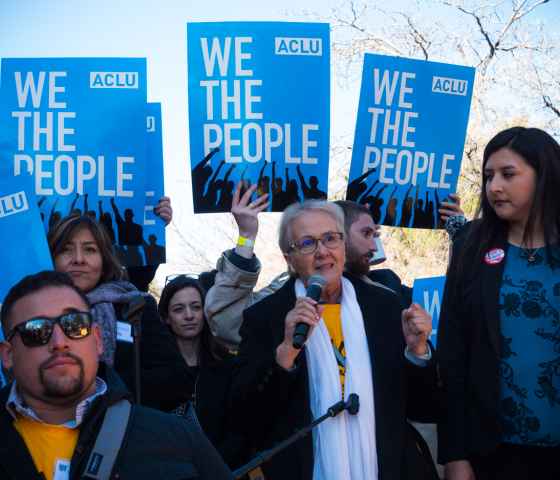
- Entertainment
- KSAT Insider
- Newsletters
Texas DPS to travelers: ‘We strongly urge anyone to avoid crossing into Mexico’
Tamaulipas on texas-mexico border is listed as ‘do not travel to’.
Rebecca Salinas , Digital Journalist
Associated Press
The Texas Department of Public Safety is warning people against traveling to Mexico amid heightened awareness about abductions and cartel violence.
DPS spokesperson Lt. Christopher Olivarez told CNN’s Erin Burnett on “Erin Burnett Out Front” that state authorities are “very concerned” following the deaths of two Americans near Matamoros earlier this month. See part of the interview in the video player above.
The Americans were among a group of four that traveled to Mexico via Brownsville for plastic surgery. Soon after entering Matamoros, the group was caught in a drug cartel shootout, and video showed them being hauled off in a truck. Two survivors were later found in a shack near the Gulf Coast.
In another case, three Texas women disappeared after crossing into Mexico to go to a flea market in the city of Montemorelos, Nuevo Leon.
Maritza Trinidad Perez Rios, 47; Marina Perez Rios, 48; and Dora Alicia Cervantes Saenz, 53, have not been seen since late February.
Olivarez said drug cartels present a dangerous situation for people crossing into border cities.
“Because of the increased violence and the fact that the Mexican drug cartels represent a significant threat to anyone who crosses into Mexico and just the sheer, you know, volatile nature of these, of these criminal organizations and the increased violence, that’s why we strongly urge anyone to avoid crossing into Mexico, especially at this time,” he said.
Mexico’s president, however, has disputed the claim that his country is dangerous, saying that it is safer than the U.S.
President Andrés Manuel López Obrador said the U.S. travel warnings were the result of a conspiracy by conservative politicians and U.S. media outlets to smear his administration.
“There is no problem in traveling safely in Mexico,” he said.
Mexico’s nationwide homicide rate is about 28 per 100,000 inhabitants, according to the Associated Press . By comparison, the U.S. homicide rate is around 7 per 100,000.
The U.S. Department of State is also asking American citizens to be cautious when visiting various states and cities in Mexico during spring break and Easter travel seasons.
Tamaulipas, the Mexican state where the group of four Americans traveled, is one of six states under the “Do Not Travel To” advisory due to crime and kidnapping.
For years the city of Matamoros has been the base for Gulf drug cartel members, who often fight among rival gangs or among themselves. Thousands of people have been reported missing in that state amid the violence.
Tamaulipas is the only Texas-Mexico border state listed under the “Do Not Travel To” distinction, though Chihuahua is listed under “Reconsider Travel.”
Federal authorities have these distinctions in place to limit travel for U.S. government employees and to give guidance to U.S. citizens.
See below for a list of Mexico travel advisories.
Do not travel to:
- Colima state due to crime and kidnapping.
- Guerrero state due to crime.
- Michoacan state due to crime and kidnapping.
- Sinaloa state due to crime and kidnapping
- Tamaulipas state due to crime and kidnapping.
- Zacatecas state due to crime and kidnapping.
Reconsider travel to:
- Baja California state due to crime and kidnapping.
- Chihuahua state due to crime and kidnapping.
- Durango state due to crime.
- Guanajuato state due to crime and kidnapping.
- Jalisco state due to crime and kidnapping.
- Morelos state due to crime.
- Sonora state due to crime and kidnapping.
Exercise increased caution when traveling to:
- Aguascalientes state due to crime.
- Baja California Sur state due to crime.
- Chiapas state due to crime.
- Coahuila state due to crime.
- Hidalgo state due to crime.
- Mexico City due to crime.
- Mexico State due to crime.
- Nayarit state due to crime.
- Nuevo Leon state due to crime and kidnapping.
- Oaxaca state due to crime.
- Puebla state due to crime and kidnapping.
- Queretaro state due to crime.
- Quintana Roo state due to crime and kidnapping.
- San Luis Potosi state due to crime and kidnapping.
- Tabasco state due to crime.
- Tlaxcala state due to crime.
- Veracruz state due to crime.
Exercise normal precautions when traveling to:
- Campeche state
- Yucatan state
Click here for more guidelines on traveling to Mexico.
- Mexican president says his country safer than United States
- 3 women missing in Mexico after crossing from Texas on trip
Copyright 2023 by KSAT - All rights reserved.
About the Authors
Rebecca salinas.
Rebecca Salinas is an award-winning digital journalist who joined KSAT in 2019. She reports on a variety of topics for KSAT 12 News.
Recommended Videos
You are using an outdated browser. Upgrade your browser today or install Google Chrome Frame to better experience this site.
Travel Health Notices
Search By Country Name or Disease
CDC uses Travel Health Notices (THNs) to inform travelers about global health risks during outbreaks, special events or gatherings, and natural disasters, and to provide advice about protective actions travelers can take to prevent infection or adverse health effects.
A THN can be posted for: 1) a disease outbreak (higher number of expected cases) in a country or region, 2) sporadic cases of a disease in an unusual or new geographic location, 3) natural and human-made disasters with severe environmental health risks, or infrastructure damage that would limit healthcare services availability and 4) mass gathering events that can lead to disease outbreaks. See types of travel notices .
Level 4 - Avoid All Travel
- Currently there are no Travel Health Notices at this level.
Level 3 - Reconsider Nonessential Travel
Level 2 - practice enhanced precautions.
- There is an outbreak of chikungunya in Timor-Leste.Chikungunya in Timor-Leste759 Updated Chikungunya in Timor-Leste April 05, 2024 There is an outbreak of chikungunya in Timor-Leste. Read More >>
- Yellow fever cases remain elevated in Nigeria, after an outbreak was first reported in November 2020. Travelers to Nigeria should take steps to prevent yellow fever by getting vaccinated at least 10 days before travel and taking steps to prevent mosquito bites.Yellow Fever in Nigeria392 Yellow Fever in Nigeria March 28, 2024 Yellow fever cases remain elevated in Nigeria, after an outbreak was first reported in November 2020. Travelers to Nigeria should take steps to prevent yellow fever by getting vaccinated at least 10 days before travel and taking steps to prevent mosquito bites. Read More >>
- There are confirmed and suspect cases of diphtheria in several regions in Guinea. Vaccination against diphtheria is essential to protect against disease. If you are traveling to an affected area, you should be up to date with your diphtheria vaccines.Diphtheria in Guinea751 Diphtheria in Guinea March 20, 2024 There are confirmed and suspect cases of diphtheria in several regions in Guinea. Vaccination against diphtheria is essential to protect against disease. If you are traveling to an affected area, you should be up to date with your diphtheria vaccines. Read More >>
- There is an outbreak of diphtheria in several states in Nigeria. Vaccination against diphtheria is essential to protect against disease. If you are traveling to an affected area, you should be up to date with your diphtheria vaccines.Diphtheria in Nigeria 740 Diphtheria in Nigeria February 16, 2024 There is an outbreak of diphtheria in several states in Nigeria. Vaccination against diphtheria is essential to protect against disease. If you are traveling to an affected area, you should be up to date with your diphtheria vaccines. Read More >>
- There is an outbreak of mpox in 22 out of 26 provinces, including urban areas, in the DRC.Mpox in the Democratic Republic of the Congo438 Mpox in the Democratic Republic of the Congo February 16, 2024 There is an outbreak of mpox in 22 out of 26 provinces, including urban areas, in the DRC. Read More >>
- Some international destinations have circulating poliovirus. Before any international travel, make sure you are up to date on your polio vaccines. Country List : Afghanistan, Algeria, Benin, Cameroon, Central African Republic, Chad, Côte d'Ivoire (Ivory Coast), Democratic Republic of the Congo, Israel, including the West Bank and Gaza, Madagascar, Malawi, Mozambique, Niger, Nigeria, Pakistan, Somalia, Yemen, Indonesia, Sudan, Mali, Botswana, Zambia, Republic of the Congo , Burundi, Burkina Faso, Kenya, Tanzania, including Zanzibar, Guinea, Mauritania, Egypt, ZimbabweGlobal Polio734 Global Polio January 05, 2024 Some international destinations have circulating poliovirus. Before any international travel, make sure you are up to date on your polio vaccines. Destination List: Afghanistan, Algeria, Benin, Botswana, Burkina Faso, Burundi, Cameroon, Central African Republic, Chad, Côte d'Ivoire (Ivory Coast), Democratic Republic of the Congo, Egypt, Guinea, Indonesia, Israel, including the West Bank and Gaza, Kenya, Madagascar, Malawi, Mali, Mauritania, Mozambique, Niger, Nigeria, Pakistan, Republic of the Congo, Somalia, Sudan, Tanzania, including Zanzibar, Yemen, Zambia, Zimbabwe Read More >>
- There is an outbreak of diphtheria in Niger. If you are traveling to an affected area, you should be up to date with your diphtheria vaccines.Diphtheria in Niger752 Diphtheria in Niger December 21, 2023 There is an outbreak of diphtheria in Niger. If you are traveling to an affected area, you should be up to date with your diphtheria vaccines. Read More >>
Level 1 - Practice Usual Precautions
- Dengue is a risk in many parts of Asia and the Pacific Islands. Some countries are reporting increased numbers of cases of the disease. Travelers to Asia and the Pacific Islands can protect themselves by preventing mosquito bites. Country List : Sri Lanka, Malaysia, Cambodia, Indonesia, Laos, SingaporeDengue in Asia and the Pacific Islands429 Updated Dengue in Asia and the Pacific Islands April 18, 2024 Dengue is a risk in many parts of Asia and the Pacific Islands. Some countries are reporting increased numbers of cases of the disease. Travelers to Asia and the Pacific Islands can protect themselves by preventing mosquito bites. Destination List: Cambodia, Indonesia, Laos, Malaysia, Singapore, Sri Lanka Read More >>
- Dengue is a risk in many parts of Africa and the Middle East. Some countries are reporting increased numbers of cases of the disease. Travelers to Africa and the Middle East can protect themselves by preventing mosquito bites. Country List : Sudan, Burkina Faso, Mali, Ethiopia, Cape Verde, MauritiusDengue in Africa and the Middle East428 Updated Dengue in Africa and the Middle East April 18, 2024 Dengue is a risk in many parts of Africa and the Middle East. Some countries are reporting increased numbers of cases of the disease. Travelers to Africa and the Middle East can protect themselves by preventing mosquito bites. Destination List: Burkina Faso, Cape Verde, Ethiopia, Mali, Mauritius, Sudan Read More >>
- Dengue is a risk in many parts of Central and South America, Mexico, and the Caribbean. Some countries are reporting increased numbers of cases of the disease. Travelers to the Americas can protect themselves by preventing mosquito bites. Country List : Colombia, Guatemala, Nicaragua, Panama, Guadeloupe, Martinique (France), Costa Rica, French Guiana (France), Mexico, Turks and Caicos Islands (U.K.), Brazil, Paraguay, Argentina, Peru, Ecuador, including the Galápagos Islands, UruguayDengue in the Americas427 Updated Dengue in the Americas April 18, 2024 Dengue is a risk in many parts of Central and South America, Mexico, and the Caribbean. Some countries are reporting increased numbers of cases of the disease. Travelers to the Americas can protect themselves by preventing mosquito bites. Destination List: Argentina, Brazil, Colombia, Costa Rica, Ecuador, including the Galápagos Islands, French Guiana (France), Guadeloupe, Guatemala, Martinique (France), Mexico, Nicaragua, Panama, Paraguay, Peru, Turks and Caicos Islands (U.K.), Uruguay Read More >>
- Many international destinations are reporting increased numbers of cases of measles. Country List : Afghanistan, Angola, Benin, Cameroon, Central African Republic, Chad, Côte d'Ivoire (Ivory Coast), Democratic Republic of the Congo, Djibouti, Ethiopia, Gabon, India, Indonesia, Liberia, Niger, Nigeria, Pakistan, Republic of the Congo , Senegal, Somalia, Republic of South Sudan, Sudan, Tajikistan, Togo, Yemen, Zambia, Nepal, Kyrgyzstan, Armenia, Mauritania, Lebanon, Equatorial Guinea, Syria, Ghana, Kazakhstan, Burkina Faso, Turkey, Qatar, United Arab Emirates, Libya, Burundi, Romania, Malaysia, Russia, Azerbaijan, Sri Lanka, UzbekistanGlobal Measles743 Global Measles March 22, 2024 Many international destinations are reporting increased numbers of cases of measles. Destination List: Afghanistan, Angola, Armenia, Azerbaijan, Benin, Burkina Faso, Burundi, Cameroon, Central African Republic, Chad, Côte d'Ivoire (Ivory Coast), Democratic Republic of the Congo, Djibouti, Equatorial Guinea, Ethiopia, Gabon, Ghana, India, Indonesia, Kazakhstan, Kyrgyzstan, Lebanon, Liberia, Libya, Malaysia, Mauritania, Nepal, Niger, Nigeria, Pakistan, Qatar, Republic of South Sudan, Republic of the Congo, Romania, Russia, Senegal, Somalia, Sri Lanka, Sudan, Syria, Tajikistan, Togo, Turkey, United Arab Emirates, Uzbekistan, Yemen, Zambia Read More >>
- There are reports of Western equine encephalitis virus (WEEV) infections in horses, humans or both, in parts of Argentina and Uruguay. Country List : Argentina, UruguayWestern Equine Encephalitis Virus in South America760 Western Equine Encephalitis Virus in South America March 14, 2024 There are reports of Western equine encephalitis virus (WEEV) infections in horses, humans or both, in parts of Argentina and Uruguay. Destination List: Argentina, Uruguay Read More >>
- There is an outbreak of Oropouche fever in the Amazonas and Acre states of Brazil. Travelers to these states of Brazil should take steps to avoid bug bites.Oropouche Fever in Brazil758 Oropouche Fever in Brazil February 06, 2024 There is an outbreak of Oropouche fever in the Amazonas and Acre states of Brazil. Travelers to these states of Brazil should take steps to avoid bug bites. Read More >>
- There have been reports of Rocky Mountain spotted fever (RMSF) in people traveling to the United States from Tecate, in the state of Baja California, Mexico.Rocky Mountain Spotted Fever in Mexico 756 Rocky Mountain Spotted Fever in Mexico December 11, 2023 There have been reports of Rocky Mountain spotted fever (RMSF) in people traveling to the United States from Tecate, in the state of Baja California, Mexico. Read More >>
- An outbreak of extensively drug-resistant (XDR) typhoid fever in Pakistan is ongoing. Extensively drug-resistant infections do not respond to most antibiotics.XDR Typhoid Fever in Pakistan397 XDR Typhoid Fever in Pakistan June 16, 2023 An outbreak of extensively drug-resistant (XDR) typhoid fever in Pakistan is ongoing. Extensively drug-resistant infections do not respond to most antibiotics. Read More >>
- Some travelers who have spent time in Mexico have been infected with multidrug-resistant (MDR) Salmonella Newport. Salmonella Newport in Mexico732 Salmonella Newport in Mexico September 08, 2022 Some travelers who have spent time in Mexico have been infected with multidrug-resistant (MDR) Salmonella Newport. Read More >>
Types of Notices
Visit U.S. Department of State's website for the latest Travel Advisories .
File Formats Help:
- Adobe PDF file
- Microsoft PowerPoint file
- Microsoft Word file
- Microsoft Excel file
- Audio/Video file
- Apple Quicktime file
- RealPlayer file
- Zip Archive file
Exit Notification / Disclaimer Policy
- The Centers for Disease Control and Prevention (CDC) cannot attest to the accuracy of a non-federal website.
- Linking to a non-federal website does not constitute an endorsement by CDC or any of its employees of the sponsors or the information and products presented on the website.
- You will be subject to the destination website's privacy policy when you follow the link.
- CDC is not responsible for Section 508 compliance (accessibility) on other federal or private website.
ACLU Issues Texas ‘Travel Advisory’
Traveling to texas may result in violation of constitutional rights, aclu warns.
WASHINGTON — The American Civil Liberties Union issued a “travel alert” today informing anyone planning to travel to Texas in the near future to anticipate the possible violation of their constitutional rights when stopped by law enforcement.
The alert comes amid the passing of a Texas law known as SB4. The law gives a green light to police officers in the state to investigate a person’s immigration status during a routine traffic stop, leading to widespread racial profiling, baseless scrutiny, and illegal arrests of citizens and non-citizens alike presumed to be “foreign” based on how they look or sound. The travel alert applies to all travelers to Texas, including U.S. travelers from other states and U.S. citizens. In addition, this alert applies to all encounters with federal, state, county law enforcement including local police and sheriffs.
“The ACLU’s goal is to protect all Texans and all people traveling through Texas — regardless of their immigration status — from illegal harassment by law enforcement,” said Lorella Praeli, ACLU director of immigration policy and campaigns. “Texas is a state with deep Mexican roots and home to immigrants from all walks of life. Many of us fit the racial profile that the police in Texas will use to enforce Trump’s draconian deportation force.”
SB4 requires Texas law enforcement to comply with the federal government’s constitutionally flawed use of detainer requests, which ask local law enforcement to hold people for U.S. Immigration and Customs Enforcement (ICE), even when they lack the legal authority to do so.
“We plan to fight this racist and wrongheaded law in the courts and in the streets. Until we defeat it, everyone traveling in or to Texas needs to be aware of what’s in store for them,” said Terri Burke, executive director of the ACLU of Texas. “The Lone Star State will become a ‘show me your papers’ state, where every interaction with law enforcement can become a citizenship interrogation and potentially an illegal arrest.”
Between 2008 and 2012, ICE requested local law enforcement to hold 834 U.S. citizens, some of whom subsequently spent days in jail as a result. Under SB4, the state of Texas is placing the rights of its residents, including U.S. citizens, in extreme jeopardy.
“It is simply a matter of time before illegal arrests occur. Local law enforcement will have to decide between violating a person’s rights and being severely fined, thrown in jail, or even being removed from office for choosing not to do so,” said Burke.
Praeli said, “Everyone has constitutional rights in this country. The state of Texas, and every law enforcement officer, must respect those rights. The ACLU stands ready to safeguard those freedoms against those who seek to diminish them.”
Local ACLU affiliates also issued a Texas travel alert. These include:
Arkansas California Colorado Delaware Hawaii Kansas Louisiana Maine Montana New Mexico New Jersey New York North Carolina North Dakota South Carolina South Dakota Tennessee Texas Utah Vermont Wisconsin Wyoming Pennsylvania
SB4 will go into effect on September 1, 2017. However, the ACLU is concerned that some law enforcement officers may begin to treat residents and travelers unfairly now. If you believe your rights have been violated because of SB4, please contact the ACLU of Texas at 1-888-507-2970.
ACLU “Know Your Rights” materials relevant to SB4 are available here: www.aclu.org/kyr-police-immigration www.aclu.org/kyr-police-immigration-spanish
Stay Informed
Every month, you'll receive regular roundups of the most important civil rights and civil liberties developments. Remember: a well-informed citizenry is the best defense against tyranny.
By completing this form, I agree to receive occasional emails per the terms of the ACLU’s privacy statement.
Learn More About the Issues in This Press Release
- Immigrants' Rights
Related Content
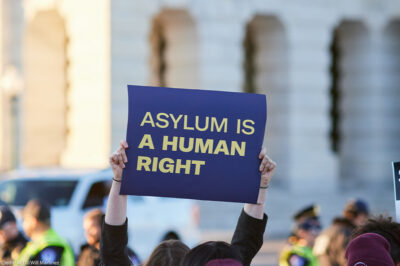
The Government Denies People Access to Asylum Because of Language Barriers. We're Fighting Back.

Chinese Immigrants Urge Appeals Court to Block Florida’s Discriminatory Housing Law

Federal Court Appeal in Miami Over Florida’s Discriminatory Housing Law

The Most Extreme Anti-Immigration Bill We've Seen
Did the ACLU Issue a Warning for People Traveling to Texas?
The american civil liberties union did issue a warning about travel to texas, but it is not the same as u.s. department of state advisories., kim lacapria, published may 10, 2017.

About this rating
In May 2017, we began receiving e-mails from readers asking if it was true that the American Civil Liberties Union had issued a travel warning or alert for the state of Texas:
Saw this on facebook. Did the ACLU really post a travel warning about traveling through Texas?
Out of context, the claim sounds potentially like fake news. But it is easily verified via the ACLU's social media accounts, where posts reference the warning :
Since the passage of SB4, we must issue a travel advisory to anyone planning to travel to Texas. What you need to know and what you can do. pic.twitter.com/pl8Zzaz5K8 — ACLU National (@ACLU) May 9, 2017
The ACLU linked to 9 May 2017 Quartz item, which reported the 7 May 2017 passage of a law enabling police to inquire about the immigration status of anyone they detained, even those who have been stopped for minor traffic violations:
SB4, as the law is known, also requires local law-enforcement officials to cooperate with federal immigration authorities who request they detain people suspected of being in the US illegally. The ACLU notice mimics the travel advisories published by the US State Department, designed to warn or alert Americans of potential dangers in foreign countries. The ACLU has only used this tactic once before , warning people about traveling to Arizona in 2010, after the state passed an even harsher provision, requiring officers to ask for immigration documents. The law resulted in a six-year legal battle eventually resolved in 2016, and hit the state with costs of boycotts and lost business.
Before the ACLU issued a national alert, its Texas branch published a blog post explaining why it opposes the law:
... SB4 will turn [Texas] into a “show me your papers” state, where any encounter with local law enforcement can turn into a citizenship interrogation. It will encourage local police without a single minute of immigration enforcement training on their resumes to profile skin tones and accents and languages. Mandatory detainers will clog our jails. The border checkpoint will be everywhere. ... SB4 will drive witnesses and victims of crime into the shadows. Fearing deportation, survivors of domestic violence and rape will let their abusers walk free. Knowing this, sheriffs from Travis, Dallas, Harris, Bexar and El Paso Counties, along with police chiefs from Dallas, Houston, Austin, Arlington, Fort Worth and San Antonio begged the legislature not to pass this awful law. But the experience and informed opinions of Texas’s law enforcement leaders carried no weight with Governor Abbott and his warmed-up pen.
SB4 is scheduled to be implemented in Texas on 1 September 2017.
Burke, Terri. "This Is Not The Texas I Know." American Civil Liberties Union of Texas . 8 May 2017.
Jarvis, Jenny. "Texas' New Ban On 'Sanctuary Cities' Could Put Police In Jail If They Fail To Enforce Immigration Holds." Los Angeles Times . 4 May 2017.
Kozlowska, Hanna. "The ACLU Issues A Travel Advisory' For Texas After The State Bans Sanctuary." Quartz . 9 May 2017.
Tinsley, Anna M. "ACLU Warns Travelers About Visiting Texas." Star-Telegram . 9 May 2017.
American Civil Liberties Union . "SB4: What You Need To Know." Accessed 10 May 2017.
LegiScan . "Texas Senate Bill 4." Accessed 10 May 2017.
By Kim LaCapria
Kim LaCapria is a former writer for Snopes.
Article Tags
Update April 12, 2024
Information for u.s. citizens in the middle east.
- Travel Advisories |
- Contact Us |
- MyTravelGov |
Find U.S. Embassies & Consulates
Travel.state.gov, congressional liaison, special issuance agency, u.s. passports, international travel, intercountry adoption, international parental child abduction, records and authentications, popular links, travel advisories, mytravelgov, stay connected, legal resources, legal information, info for u.s. law enforcement, replace or certify documents.
Share this page:
Worldwide Caution
Caution October 19, 2023
Due to increased tensions in various locations around the world, the potential for terrorist attacks, demonstrations or violent actions against U.S. citizens and interests, the Department of State advises U.S. citizens overseas to exercise increased caution. U.S. citizens should:
- Stay alert in locations frequented by tourists.
- Enroll in the Smart Traveler Enrollment Program ( STEP ) to receive information and alerts and make it easier to locate you in an emergency overseas.
- Follow the Department of State on Facebook and Twitter .
Learn about your destination
External link.
You are about to leave travel.state.gov for an external website that is not maintained by the U.S. Department of State.
Links to external websites are provided as a convenience and should not be construed as an endorsement by the U.S. Department of State of the views or products contained therein. If you wish to remain on travel.state.gov, click the "cancel" message.
You are about to visit:
Get Daily Travel Tips & Deals!
By proceeding, you agree to our Privacy Policy and Terms of Use .
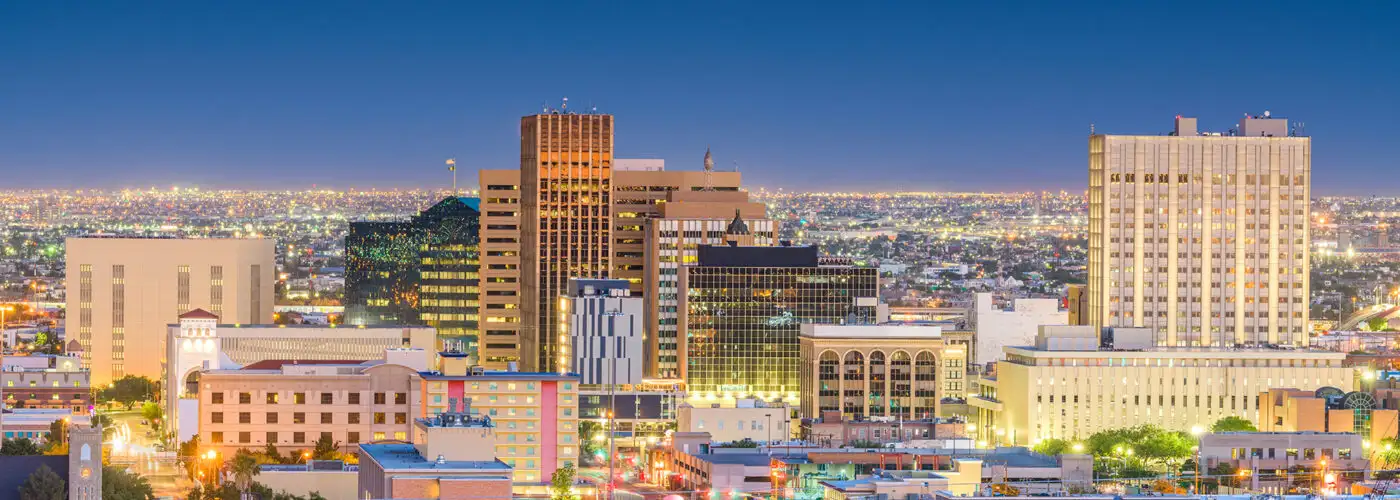

Is El Paso Safe? Warnings and Dangers Travelers Need to Know
The Editors
We are the editors of SmarterTravel! Together we have appeared in countless travel publications including ABC News, Huffington Post, Travel + Leisure, USA Today, and more. We dedicate our days to creating and producing expert travel content, including packing tips, general travel advice, destination inspiration, and helpful videos. Follow us across social media on YouTube , Pinterest , Facebook , Instagram , and Twitter or drop us a line to say hi at [email protected]!
Travel Smarter! Sign up for our free newsletter.
El Paso, Texas, is a city worth visiting. Go for the rich culture, the Chihuahuan Desert, the Rio Grande, and, of course, the tasty food—whatever you do, order the sopapillas . But if you’ve been paying attention to the news, you might be forgiven for wondering, “Is El Paso safe?”
Tragically, one of America’s deadliest mass shootings recently played out at a Walmart in eastern El Paso, killing 22. And El Paso is a border town, sharing the line with Juarez, Mexico, home of the notorious Juarez cartel.
Surprisingly, though, El Paso is consistently ranked as one of America’s safest big cities . This is thanks to strong policing, a large military presence, plenty of border security, recent urban and economic development, and engaged citizens and communities. The El Paso crime rate, regardless of whether you’re talking about violent or property crime, is actually dropping .
Beyond violence, travelers also wonder, “Is El Paso dangerous in terms of natural disasters?” In fact, El Paso has a lower risk of severe weather than other Texas cities, though parts of El Paso do flood during heavy rainfall.
Still, whether you’re out exploring Franklin Mountains State Park or El Paso’s historic downtown, it helps to keep in mind some key tips regarding El Paso safety.
Tips for Staying Safe in El Paso
- One key to staying safe is knowing which are the safest neighborhoods in El Paso, TX. To stay in the El Paso safety zone, hang out in neighborhoods like Album Park, Cielo Vista, Rim Area, and East Side—and steer clear of higher-crime areas like Chihuahuita, Magoffin, and A Presidential Neighborhood.
- El Paso’s buses stop running after dark, but cabs, Ubers, and Lyfts are readily available. Take the standard precautions like sitting in the back seat and using the app to share your ride progress with a friend or loved one.
- If you’re considering crossing the border from El Paso to Juarez, Mexico, keep in mind that Juarez suffers high rates of violence and crime. If you go, read up on the U.S. Consulate’s advice for travelers .
Safe Places—and Places to Avoid—in El Paso
The safest neighborhoods in El Paso, TX, include Album Park, where the chance of becoming a crime victim is 95 percent lower than the national average , as well as Cielo Vista, Rim Area, and East Side, where the crime rates are nearly as low .
El Paso’s west side is upscale, safe, and full of attractions, including UTEP (University of Texas at El Paso) as well as worthwhile restaurants and bars, according to Kayak . The city’s east side is less affluent, but you’ll find shopping malls as well as popular places to hike and climb. Note that although the 2019 Walmart shooting occurred near the Cielo Vista Mall on El Paso’s east side, the shooter was from out of town, not a local.
And though El Paso, overall, is quite safe, there are neighborhoods that are best avoided because of higher crime rates, including Chihuahuita , A Presidential Neighborhood (yes, that’s its name), and Magoffin .
A neighborhood called Angel’s Triangle— formerly Devil’s Triangle —in northeast El Paso was notorious for prostitution, drugs, gangs, and poverty up until the 1990s, when a community initiative helped slashed its crime rate significantly. Angel’s Triangle still suffers from poverty, but its specific story of improvement reflects the overall trend toward El Paso safety.
How to Get Around Safely in El Paso
A few years ago, El Paso adopted a new transit plan to connect the city more efficiently and to encourage ridership in safe, eco-responsible ways. A downtown shuttle, called the Circulator , is now available for free. El Paso’s bus system is run by an agency called Sun Metro, which encourages passengers to be alert for suspicious behavior and packages, to report them to a coach operator or a transit supervisor, and to call 911 in an emergency.
Unfortunately, much of El Paso’s bus system shuts down at night, although taxis and app-based hired cars are readily available. Just remember, whenever you take an Uber or Lyft , take the standard precautions like choosing a busy, well-lit area when waiting for your ride, confirming that the driver’s face and license plate match what comes up on your phone, sitting in the back seat, and staying in touch with a friend about your ride—Uber has added a 911 button and the ability to geo-share your ride’s progress. Also, don’t tell the driver your name when you arrive; ask for the name on the booking instead.
Renting a car to get around El Paso is a sound option as well, especially if you’re planning on traveling to other parts of western Texas or across the border into Juarez, Mexico—though you should always lock your car, hide all valuables, and park in well-lit, non-secluded spots.
Bordering El Paso: Is Juarez, Mexico, Safe?
It’s tempting, when you’re this close to Mexico, to cross the border to party in legendary nightclubs, shop the mercado for authentic Mexican souvenirs, wander Samalayuca ’s otherworldly sand dunes, and visit historic landmarks like the stately Nuestra Señora de Guadalupe Cathedral (also known as the Cathedral of Ciudad Juarez), which was built in 1659.
But while El Paso is a remarkably safe city, it’s a different story in nearby Ciudad Juarez. In the not-so-distant past, Juarez held the tragic title of the world’s murder capital; nearly 11,000 people were killed there between 2007 and 2013. Juarez was a true war zone, plagued with unrestrained bloodshed, kidnappings, and extortion related mostly to narcotics trafficking. The ruthless rivalry between the Sinaloa and Juarez cartels translated into real-life horror scenes left and right. The city has also seen a shocking femicide epidemic, with thousands of women disappearing or being killed since the 1990s.
Since then, the Sinaloa drug cartel, which operates in Mexico with impunity, wrested control of Ciudad Juarez and maintains a mafia-like grip on the city—which has actually generated a recent era of fragile peace and greater calm . Though a notable amount of violence still exists, especially in the form of gang killings , things have gotten markedly better since 2010.
Regardless, traveling to Juarez, Mexico, remains risky, so much so that the U.S. has issued a travel alert about it. If you decide to visit Juarez, consider taking an expert-led tour and heeding the U.S. Embassy’s advice: “Be aware of your surroundings at all times. Monitor local media for updates. Use caution when driving in heavy traffic or at night. Drive with your doors locked and windows up.”
More from SmarterTravel:
- 8 Packable Things That Could Save Your Life
- 10 Travel Safety Tips You Can Learn from the CIA
- 12 Life-Saving Travel Hacks for Your Next Trip

RFID-Blocking Passport Wallet

Anti-Theft Backpack

Safety Whistle
—original reporting by Avital Andrews
We hand-pick everything we recommend and select items through testing and reviews. Some products are sent to us free of charge with no incentive to offer a favorable review. We offer our unbiased opinions and do not accept compensation to review products. All items are in stock and prices are accurate at the time of publication. If you buy something through our links, we may earn a commission.
Top Fares From

Don't see a fare you like? View all flight deals from your city.
Today's top travel deals.
Brought to you by ShermansTravel
Porto to Lisbon: 7-Nt, Small-Group Portugal...
Indus Travels

Greenland: Luxe, All-Incl. 11-Nt Exploration Small-Ship...
Swan Hellenic
Ohio: Daily Car Rentals from Cincinnati

Trending on SmarterTravel

Texas Gets 'Extreme' Warning at US Border
N ational Weather Service (NWS) meteorologists have issued an "extreme" weather warning for far western Texas at the United States-Mexico border on Wednesday morning.
Weather conditions are ideal for "extreme fire behavior," according to an NWS report, prompting meteorologists to issue a red flag warning for the El Paso, Texas, region. The conditions will be at their worst on Thursday, as a strong pressure system moves south from Colorado into New Mexico and Texas.
Red flag warnings have been issued for all three states. Strong winds, low humidity and high temperatures are typically the reasons behind a red flag warning.
Read more: Emergency Funds: How to Build One and Where to Keep It
"West-southwest winds with sustained speeds of 30 to 40 mph and peak gusts around 55 mph combined with very low relative humidity values will lead to critical fire weather conditions and the risk of rapid fire start and spread through much of the daytime hours Thursday," the NWS said.
"Fuel moisture had dried rapidly this month, especially along the desert lowlands, due to preexisting drought status and lack of recent precipitation. Winds subsiding overnight into Friday morning, likely picking back up again Friday and Saturday afternoons."
The NWS added that "any fires that develop will likely spread rapidly."
NWS meteorologist Luke Rogers told Newsweek that the NWS typically issues the most red flag warnings in the El Paso area during April and May. He said average temperatures in El Paso are in the low to mid-80s.
"Being in the desert southwest, it's very, very dry, so our concerns with regards to tomorrow are the very dry humidity values," he said.
Slightly above-average winter precipitation has delayed fuels from drying out, but Rogers said the region is now starting to see dry conditions.
In addition to a red flag warning, a high wind warning, wind advisory, high wind watch, fire weather watch, and hazardous weather outlook were also issued in the El Paso region.
"Outdoor burning is not recommended," the NWS said. "A Red Flag Warning means that critical fire weather conditions are either occurring now or will shortly. A combination of strong winds, low relative humidity, and warm temperatures can contribute to extreme fire behavior."
Blowing dust also is expected in the region on Thursday, Rogers said.
On Tuesday, special weather statements were issued for 10 states in the U.S. Northeast for similar conditions, although the alert wasn't elevated to a red flag warning . The region retained lots of moisture from a wet winter, limiting fire access to dry fuels, which kept the alert from becoming a red flag warning.
Related Articles
- Fire Warnings Issued for Seven States: 'Critical Conditions'
- Texas Weather Update as Severe Thunderstorms Forecast
- Texas Hit by Barrage of Extreme Weather Warnings
Start your unlimited Newsweek trial
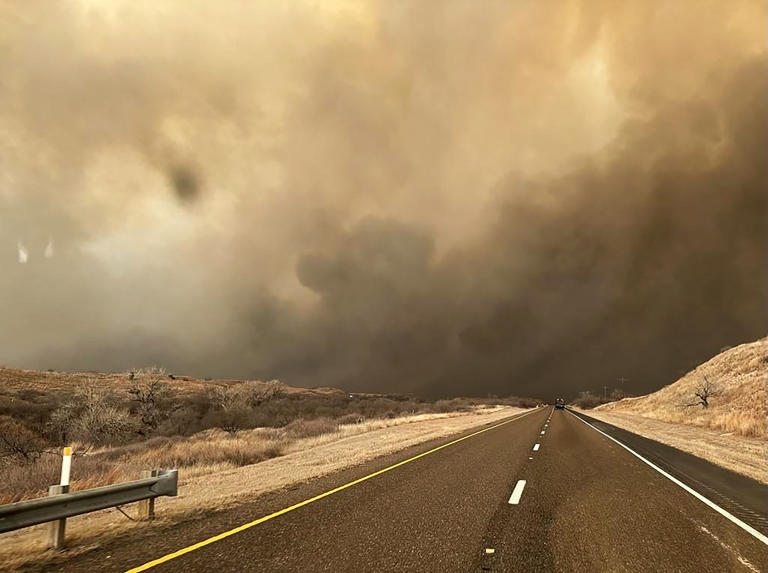
Skip to main content
ACLU Issues Travel Advisory for Texas After Passage of Extreme Anti-Immigrant Law
Media contact.
PHOENIX—The American Civil Liberties Union (ACLU) affiliates of Arizona, New Mexico, Oklahoma, and Arkansas issued a travel advisory warning people traveling through Texas to know their rights and take significant precautions to protect themselves and their loved ones because of extremist laws Texas lawmakers have passed targeting immigrants and people of color. While the laws don’t take effect until February and March of 2024, the issuance of the advisory enables people to consider travel plans and prepare accordingly. The bills Texas Gov. Greg Abbott signed into law institute immigration enforcement mechanisms and mandatory minimum sentences that threaten the safety and rights of people traveling in Texas, regardless of their immigration status:
- SB4-88S4 creates a new state crime for unauthorized entry or re-entry into Texas from a foreign country. It puts tremendous power in the hands of local and state law enforcement who are not trained in immigration law and have no proper authority to enforce it. It includes a provision to allow Texas judges to direct people in some cases to depart Texas into Mexico without a chance to seek legal protections.
- SB4-88S3 creates up to a 10-year minimum sentence for people accused of “human smuggling,” under which Texas has charged children as young as 14.
“Texas’ decision to go down the failed path of Arizona’s SB 1070 will only harm the people who call Texas home. Divisive policies like SB 1070 and SB 4 are fueled by racism and xenophobia and have no place in Arizona, Texas, or anywhere,” said Victoria López, director of program and strategy for the ACLU of Arizona . “The cost to immigrants as well as citizens across the state is too great. Arizonans traveling in Texas will be at risk of getting swept up in this scheme to criminalize and deport people of color. This is nothing more than political grandstanding at the expense of immigrants.”
These new laws were passed by the legislature despite fierce opposition from communities across Texas, immigrant rights’ organizations and even many lawmakers. Extremist politicians were able to pass these bills by expanding an undemocratic majority built on gerrymandering and onerous and unnecessary voting restrictions that disenfranchise many of the same communities of color now most affected by these new laws.
“Arizona politicians tried to circumvent the law and take on federal immigration enforcement with SB 1070 but they failed. In the wake of 1070, Arizona faced boycotts, costly lawsuits, and a soiled reputation. Arizona families and communities suffered separation, violations of their rights, and long-lasting trauma. Extremist politicians in Texas refuse to learn from our mistakes,” said López . “We stand in solidarity with our colleagues and communities in Texas in opposition to this bill.”
The travel advisory can be found here .
Stay informed
- Immigrants' Rights
Related content
Aclu of arizona commends the veto of sb 1231.

Border Patrol’s Abusive Practice of Taking Migrants’ Property Needs...
Immigrants’ rights advocates release new report detailing border..., aclu of arizona, kino border initiative, the florence immigrant and....
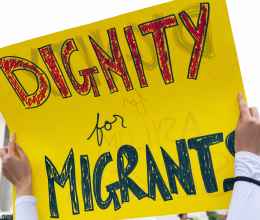
Your Guide to Discussing the Right to Seek Asylum at the Dinner Table
In contempt of court: a federal judge finds maricopa county sheriff..., legal organizations sue ice for illegally preventing attorneys from....

The Price of Seeking Asylum – How CBP is Trashing Migrants’ Most...
160+ organizations call for an end to mistreatment of religious....
Watch CBS News
U.S. issues travel warning for Israel with Iran attack believed to be imminent and fear Gaza war could spread
By Debora Patta , Tucker Reals
Updated on: April 13, 2024 / 5:25 PM EDT / CBS News
Update: Iran launched drone attacks against Israel on Saturday. Read CBS News' latest coverage here .
Tel Aviv — Israel is bracing for a worst-case scenario that U.S. officials believe could materialize within just hours — the possibility of a direct attack on Israeli soil by Iran in retaliation for a strike almost two weeks ago that killed seven Iranian military officers. Iran has vowed to take revenge for Israel killing its commanders, who were hit by an April 1 strike on the Iranian embassy in Syria's capital.
Two U.S. officials told CBS News that a major Iranian attack against Israel was expected as soon as Friday, possibly to include more than 100 drones and dozens of missiles aimed at military targets inside the country. Sources have told CBS News the retaliation could include attacks carried out both by Iranian forces, and proxy groups around the region that it has been funneling additional arms to for weeks.
The officials said it would be challenging for the Israelis to defend against an attack of that magnitude, and while they held out the possibility that the Iranians could opt for a smaller-scale attack to avoid a dramatic escalation, their retaliation was believed to be imminent.
Asked Friday how imminent he believes an attack is, President Biden responded, "I don't want to get into secure information, but my expectation is sooner than later." The president urged Iran not to move forward, saying his message to Tehran was: "Don't."
Tehran has not indicated publicly how or when it will return fire, so it's unclear how far Iran's leaders will go. If they decide to carry out a direct attack on Israel, there's fear it could blow Israel's ongoing war against Iranian ally Hamas up into a much wider regional conflict.
With the Iranian retaliation expected at any time, the U.S. State Department on Thursday warned Americans in Israel not to travel outside major cities, which are better protected from incoming rocket fire by the country's Iron Dome missile defense system. The latest guidance noted that travel by U.S. government employees in Israel could be further restricted with little notice as things develop in the tinderbox region.
"Whoever harms us, we will harm them," Prime Minister Benjamin Netanyahu vowed Thursday as he visited troops at an Israel Defense Forces airbase. "We are prepared … both defensively and offensively."

On Saturday, all U.S. embassies in the Middle East were put on high alert and required to hold emergency action committee meetings. Diplomats in Lebanon and Israel were specifically told not to travel to certain areas within those countries.
Sima Shine, a security expert and former official with Israel's national intelligence agency Mossad, told CBS News it was a dangerous moment for the region, and the "most worried" she has been. She said anxiety over an all-out war was likely just as high "on both sides, in Israel and in Iran."
If Iran does choose to strike Israel directly, it could involve a complex missile and drone attack similar to the one Iranian forces launched against a Saudi oil facility in 2019 .
"They will try to do it on the military or some military asset," Shine predicted. "But the question will be the damage. If there would be many injured people, killed or injured … I think it has the potential for a huge escalation."
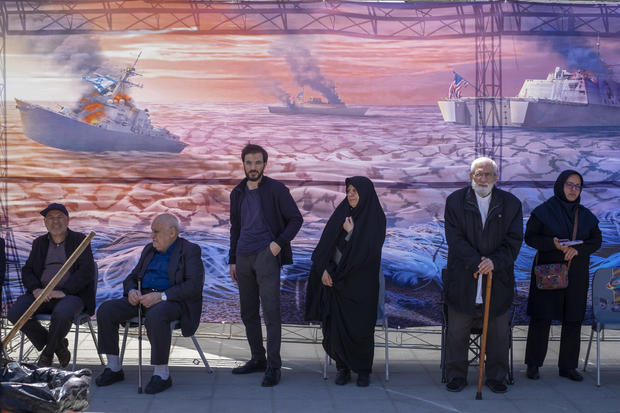
Shine stressed, however, that she still believes neither side actually wants a regional conflict.
U.S. "really trying to avoid war"
The U.S. sent a senior general to Israel this week to coordinate with the close American ally on any response it might make to an Iranian attack. Speaking Friday on "CBS Mornings," America's top military officer said, "we're really trying to avoid war."
"This is part of the dialogue that I have with my counterparts within the region, to include the Israeli chief of defense, who I talked to yesterday," said Joint Chiefs chairman Gen. Charles Q. Brown, Jr., adding that the U.S. military was "doing things not only to prevent a war, but at the same time, one of my primary things is to make sure all the forces in the region are protected."
"My role, as the chairman of the Joint Chiefs, is to plan and prepare," Brown said. "That's one thing we do very well."
Brown's Israeli counterpart, Chief of the General Staff Lt. Gen. Herzi Halevi, "completed a comprehensive situational assessment on the readiness of the IDF for all scenarios," Israel's military said Friday.
"The IDF is very strongly prepared, both offensively and defensively, against any threat," Halevi was quoted as saying in the statement. "The IDF continues to monitor closely what is happening in Iran and different arenas, constantly preparing to deal with existing and potential threats in coordination with the United States Armed Forces."
The IDF said the visiting U.S. general, Central Command chief Gen. Michael Erik Kurilla, was taking part in the IDF's situational assessment.
The dilemma for Iran, said Israeli expert Shine, is to figure out how to deliver its promised response to Israel's attack in Syria, but in a way that does not lead to further escalation. Likewise, Shine said Israel could choose to show restraint when it responds to whatever Iran eventually does.
If either side gets the balance wrong, the consequences for the region, and even the world, could be dire.
Weijia Jiang, David Martin, Margaret Brennan and Olivia Gazis contributed reporting.
- Middle East
- Benjamin Netanyahu
Debora Patta is a CBS News foreign correspondent based in Johannesburg. Since joining CBS News in 2013, she has reported on major stories across Africa, the Middle East and Europe. Edward R. Murrow and Scripps Howard awards are among the many accolades Patta has received for her work.
More from CBS News

Hamas releases video of Israeli-American hostage Hersh Goldberg-Polin

Pelosi says Netanyahu "should resign"

Baby saved from dying mother's womb after Israeli airstrike named in her honor

Why the U.S. is investigating an ultra-Orthodox Israeli army battalion
Education Abroad
- Advisory Board
- Our Students
- Virtual Photo Exhibit
- Banner Competition Exhibit
- Becoming Globally Engaged
- How are we doing?
- Faculty-Led
- Summer Hubs
- Virtual Opportunities
- International Exchange
- International Internship
- International Research
- International Service Learning
- Non-Affiliated
- Advising Appointments
- Planning Steps
- Financial Assistance
- Education Abroad Forms
- Passport & Travel Tips
- LGBTQIA+ & Accessibility Abroad
- Withdrawals
- Exchange Program Coordinators
- Exchange Students
- International Exchange Photos & Videos
- Byron Augustin Photography Award
- Isis de la O Student Award
- Graduation Sashes
- Reverse Culture Shock
- Applying Your Experience Professionally
- Education Abroad Ambassador Program
- Faculty Handbook
- Health and Safety Guide
- Developing a Program
- Program Proposals
- Insurance for Guests
- General Information
- International Health Insurance
Travel Advisories
- Mental Health
- Health & Safety Abroad Recommendations
- Parents & Loved Ones
- Trip Cancellation Insurance
- Education Abroad Fair
- Current Students
- Faculty & Staff
- Family & Visitors

The safety of our students is the top priority for Texas State University. Approved locations for Education Abroad programs must have a travel advisory level 1 or level 2 issued by the U.S. Department o f State.
Smart Traveler Enrollment Program (STEP)
If a is a U.S. citizen they can register their travel plans with the U.S. Department of State’s Smart Traveler Enrollment Program (STEP). STEP enrolls a traveler’s itinerary with the nearest U.S. Embassy or Consulate, sends travelers health and security updates for the countries they are traveling to, as well as helps friends and family to contact travelers in case of an emergency.
Education Abroad Travel Alert Policy
Texas State University monitors information relevant to the safety of its Education Abroad students, faculty, and staff as their safety and security is of the utmost importance. In evaluating the safety of travel abroad on university-sponsored Education Abroad programs, Texas State gives primary consideration to Travel Advisories and Alerts issued by the U.S. Department of State and the Centers for Disease Control and Prevention .
- Investigates
- Houston Life
- Newsletters
WEATHER ALERT
4 warnings in effect for 5 counties in the area
Entertainment, 5 family friendly travel destinations in texas to visit this spring, a mom’s guide to exploring the outdoors in the lone star state.
Krisna Menier , Membership Director
HOUSTON – Hey there, fellow adventurers! As winter fades away and the flowers begin to bloom, spring in Texas is the perfect time for families to venture out and explore. As a mom on a mission to ensure maximum fun during our travels, here’s my round-up of the coolest spring nature destinations in the Lone Star State.
Santa Ana National Refuge
Recommended Videos
Lush trails, chasing after colorful birds, and crossing a tree bridge for the ultimate bird’s eye view awaits you at the Santa Ana National Refuge ! It’s like stepping into a real-life nature documentary, and trust me, your little adventurers will be buzzing with excitement.
- Distance from Houston: 5 hours
- Admission: Daily passes are $5 per vehicle and yearly passes are $10 per vehicle. The first Sunday of every month is FREE!
Llano River State Park
Who’s up for a splash-tastic adventure? Head on over to the Llano River , where the water’s cool and the vibes are even cooler! Head to the visitor center and pick your kids up a FREE junior ranger explorer pack, packed with goodies to conquer the great outdoors. From floating down the river to casting a line for the catch of the day, there’s no shortage of fun to be had.
- Admission: Adults are $5 daily. Children 12 years and under are free. Camping is between $10 - $20.
Rockport Beach
Rockport Beach is your ticket to sun-soaked bliss and sandy shenanigans. Managed by Blue Wave Beaches, this slice of paradise boasts squeaky-clean sands and low tide waters for every swimmer to enjoy.
- Distance from Houston: 3 hours
- Admission: $10 daily or $40 annual vehicle parking fee.
Comal River
Grab your tubes , slap on some sunscreen, and prepare for a tubing adventure like no other. With gentle currents and heart-pounding tube chutes, it’s the perfect blend of chill vibes and adrenaline rushes. The Comal River is known for its shorter float and calmer waters making it perfect for families.
- Admission: Expect to spend $15-22 per person, including shuttle, tube rental, and parking fees.
RELATED: Play in New Braunfels: Grab your inner tube, sunblock and beach towels!
Westcave Outdoor Discovery Center
Westcave Outdoor Discovery Center is a haven of adventure and tranquility. Surrounded by towering cliffs and lush greenery, you are transported to a world where time slows down and nature takes center stage. Through hands-on activities like nature walks, guided photography grotto hikes and star gazing , there is something for everyone to relax and enjoy the serenity of the environment.
- Admission: Varies based on tours between $5 - $50.
So, grab your crew, pack your sense of adventure (and some sunscreen), and get ready to make memories that’ll last a lifetime. When it comes to family fun in Texas, the sky’s the limit!
Have other spots your family loves to visit in the spring in Texas? Share your favorites in the comments section below!
Copyright 2024 by KPRC Click2Houston - All rights reserved.
About the Author
Krisna menier.

IMAGES
COMMENTS
Places With a Level 4 Travel Advisory. These are the primary areas the U.S. government says not to travel to right now, in alphabetical order: Jump to Place: Afghanistan: The Central Asian country ...
The Capitol Visitor Center hours are 9 a.m.- 5 p.m. Monday through Saturday and noon-5 p.m. Sunday year-round. All centers are closed on New Year's Day, Easter Sunday, Thanksgiving Day, Christmas Eve, and Christmas Day. For 24-hour highway condition information, call 800-452-9292 or visit drivetexas.org.
Travel Advisories. Travel Advisories. Learn about your destination. Advisory Level Date Updated; Israel, the West Bank and Gaza Travel Advisory : Other: April 11, 2024: Liechtenstein Travel Advisory: Level 1: Exercise Normal Precautions: July 26, 2023: North Macedonia Travel Advisory:
The Travel Information Division promotes travel to and within the state of Texas. The division produces and distributes travel literature and operates 12 travel information centers, DriveTexas™, and Texas Highways magazine and manages programs such as Don't mess with Texas, Adopt-a-Highway, and Keep Texas Beautiful.
The travel advisory warns people in Arizona, New Mexico, Oklahoma, Arkansas and Louisiana that there is an increased risk of civil and constitutional rights violations in Texas.
Health Alerts and Advisories main content. Health Topic. Health Alerts and Advisories. Program. Press Office. Phone. 512-776-7119. Email. [email protected]. Agency Click here to expand and collapse. Agency. About DSHS; ... Texas Click here to expand and collapse. Texas. Texas.gov; Texas HHS;
Check out your destination cities, hotels, restaurants and desired attractions prior to departure. Links to the tourism websites of Texas cities can be found below: Find Texas travel guidelines with healthy travel tips, dining at Texas restaurants, open attractions, and state resources for an exciting trip in Texas.
ALBUQUERQUE - The American Civil Liberties Union (ACLU) affiliates of New Mexico, Arizona, Oklahoma, Arkansas, Louisiana, San Diego and Imperial Counties, and Texas issued an advisory warning people traveling through Texas to know their rights and take significant precautions to protect themselves and their loved ones because of extremist laws Texas lawmakers have passed targeting immigrants ...
STATE OF TEXAS — Exercise increased caution in Texas due to risk of civil and constitutional rights violations The American Civil Liberties Unions (ACLUs) of New Mexico, Oklahoma, Arkansas, Louisiana, Arizona, Texas and San Diego and Imperial Counties are issuing a travel advisory for their residents about the threat of civil and constitutional rights violations when traveling
May 21, 2020: Under Governor Abbott's Executive Order , all air travel restrictions related to the COVID-19 pandemic are terminated, ... DPS screening stations along the Texas/Louisiana border have been closed. CONTACT US. Should you have questions and need to contact DPS about complying with the Executive Orders, please call us at (844) 986 ...
Travel. Texas does not have any COVID-19 restrictions related to traveling. This is true for travelers who arrive in Texas from other U.S. states or other counties. Past federal travel orders requiring COVID-19 testing, masks, and vaccinations are now expired. Travelers to Texas are not required by law to quarantine or self-isolate.
CNN —. US travel restrictions instituted in the early months of the Covid-19 pandemic by states have been eliminated. However, the US Centers of Disease Control and Prevention suggests delaying ...
Tamaulipas on Texas-Mexico border is listed as 'Do Not Travel To'. The Texas Department of Public Safety is warning people against traveling to Mexico amid heightened awareness about ...
Travel Tips. Travel Information. Travelers may call 1-800-452-9292 daily for travel information, professional trip planning assistance and emergency road condition information. Highway Conditions. See what's happening on the roadways around the state. Highway Conditions information is provided by TxDOT districts to alert travelers about current ...
CDC uses Travel Health Notices (THNs) to inform travelers about global health risks during outbreaks, special events or gatherings, and natural disasters, and to provide advice about protective actions travelers can take to prevent infection or adverse health effects. A THN can be posted for: 1) a disease outbreak (higher number of expected ...
May 9, 2017 10:15 am. WASHINGTON — The American Civil Liberties Union issued a "travel alert" today informing anyone planning to travel to Texas in the near future to anticipate the possible violation of their constitutional rights when stopped by law enforcement. The alert comes amid the passing of a Texas law known as SB4.
For all other questions, please call the DSHS Immunization Unit at 800-252-9152 or email [email protected]. Sites Relating to International Travel. ... Travel warnings and announcements, travel publications, lists of doctors/hospitals abroad, Medevac/medical insurance.
The American Civil Liberties Union did issue a warning about travel to Texas, but it is not the same as U.S. Department of State advisories. Kim LaCapria Published May 10, 2017
Travel Advisory. August 22, 2023. See State Summaries. K C. Reissued after periodic review with general security updates, and the removal of obsolete COVID-19 page links. Country Summary: Violent crime - such as homicide, kidnapping, carjacking, and robbery - is widespread and common in Mexico. The U.S. government has limited ability to ...
Worldwide Caution. Due to increased tensions in various locations around the world, the potential for terrorist attacks, demonstrations or violent actions against U.S. citizens and interests, the Department of State advises U.S. citizens overseas to exercise increased caution. U.S. citizens should: Stay alert in locations frequented by tourists.
Travel news, itineraries, and inspiration delivered straight to your inbox. ... Warnings and Dangers Travelers Need to Know. The Editors SmarterTravel. ... El Paso, Texas, is a city worth visiting.
Weather conditions are ideal for "extreme fire behavior," according to an NWS report, prompting meteorologists to issue a red flag warning for the El Paso, Texas, region. The conditions will be at ...
PHOENIX—The American Civil Liberties Union (ACLU) affiliates of Arizona, New Mexico, Oklahoma, and Arkansas issued a travel advisory warning people traveling through Texas to know their rights and take significant precautions to protect themselves and their loved ones because of extremist laws Texas lawmakers have passed targeting immigrants and people of color.
With the Iranian retaliation expected at any time, the U.S. State Department on Thursday warned Americans in Israel not to travel outside major cities, which are better protected from incoming ...
Texas State University monitors information relevant to the safety of its Education Abroad students, faculty, and staff as their safety and security is of the utmost importance. In evaluating the safety of travel abroad on university-sponsored Education Abroad programs, Texas State gives primary consideration to Travel Advisories and Alerts ...
Texas outdoor travel destinations (Canva Pro / Getty Images) HOUSTON - Hey there, fellow adventurers! As winter fades away and the flowers begin to bloom, spring in Texas is the perfect time for ...
RELATED: U.S. issues travel warning for another popular tropical vacation destination. RELATED: Texas man shares warning after partner seriously hurt during beach getaway in Mexico.